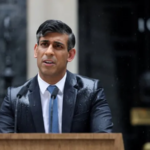- The Duke of Sussex chose to stay at a hotel during his recent visit to the UK

Prince Harry turned down an invitation by the King to stay at a royal residence when he visited the UK earlier this month because he had ‘security concerns’, it has been claimed.
He is said to have declined his father’s offer because it did not come with any taxpayer-funded personal security provision, which would leave him staying in a ‘visible location with public entrance and exit points and no police protection’.
Instead he chose to stay at a hotel – presumably with members of the public – because it meant he ‘could come and go unseen’, claimed The Telegraph.
The newspaper further maintained that the Duke of Sussex ‘remains devastated’ about the withdrawal of his automatic right to police protection which he is still battling the Home Office over through the British courts.
He now has to give the Metropolitan Police 28 days’ notice before coming to the UK if he wants to apply for security provision, with each request assessed on an individual basis by Ravec, the committee which oversees the protection of royalty and public figures.
While it has not been revealed where the King offered Harry a room, St James’ Palace is a strong possibility.
Princess Beatrice has a permanent apartment there, while Princess Anne has a suite of rooms – and a parking place – she uses when staying in London.
Other members of the Royal Family use it on an ad hoc basis.
Moreover it is situated directly adjacent to Clarence House where the King stays when in London.
It would have allowed father and son a place to meet in relative privacy and is guarded round-the-clock by a ‘ring of steel’.
In fact all royal residences – whichever one Harry was offered – feature armed guards at entry and exit points, unlike any London hotel, and boast the most sophisticated security systems in the country to protect working members of the family.
Buckingham Palace has consistently declined to comment on anything to do with Harry and his father.
But a spokesman for the prince chose to issue a statement when he came to London at the beginning of May for a service to mark the 10th anniversary of the Invictus Games.
It strongly suggested that while Harry was keen to meet his father, the King was effectively ‘too busy’ to see him.
However it has since become clear that while His Majesty did indeed have a packed programme of engagements that week, the King had made conciliatory overtures that would have enabled him to see his son.
In all Harry spent three nights in the capital without seeing any family members before meeting his wife, Meghan, at Heathrow airport and flying onto Nigeria for a quasi-royal tour.

In 2020 Harry applied for a judicial review over the decision to strip himself and his family of publicly-funded police protection when they chose to quit royal duties and leave the UK.
Instead a ‘bespoke’ arrangement was created that involved assessing each visit on its merits.
The prince has since accused the Home Office of subjecting him to ‘unlawful and unfair treatment’ and claims he has been singled out and treated ‘less favourably’ than other family members as ‘punishment’.
He has offered to pay for his own security but was firmly told the Metropolitan Police couldn’t be treated as a service for ‘hire’.
In February he conclusively lost his legal challenge and was left with an estimated £1 million bill.
However he has vowed to fight on and says he does not feel safe bringing his wife and children to the UK under the current arrangements.
According to the Telegraph, the prince has only been permitted police protection when taking part in royal events, such as the late Queen’s funeral, or when he was transported to meet the King from Heathrow in February after his cancer diagnosis.
The newspaper – which has been given a wealth of detail about Harry’s security arrangements – claims that when travelling to and from his hotel in February, the prince only had his own, private bodyguards.
Buckingham Palace declined to comment, while a request for comment was put to the Sussexes UK spokesman.



